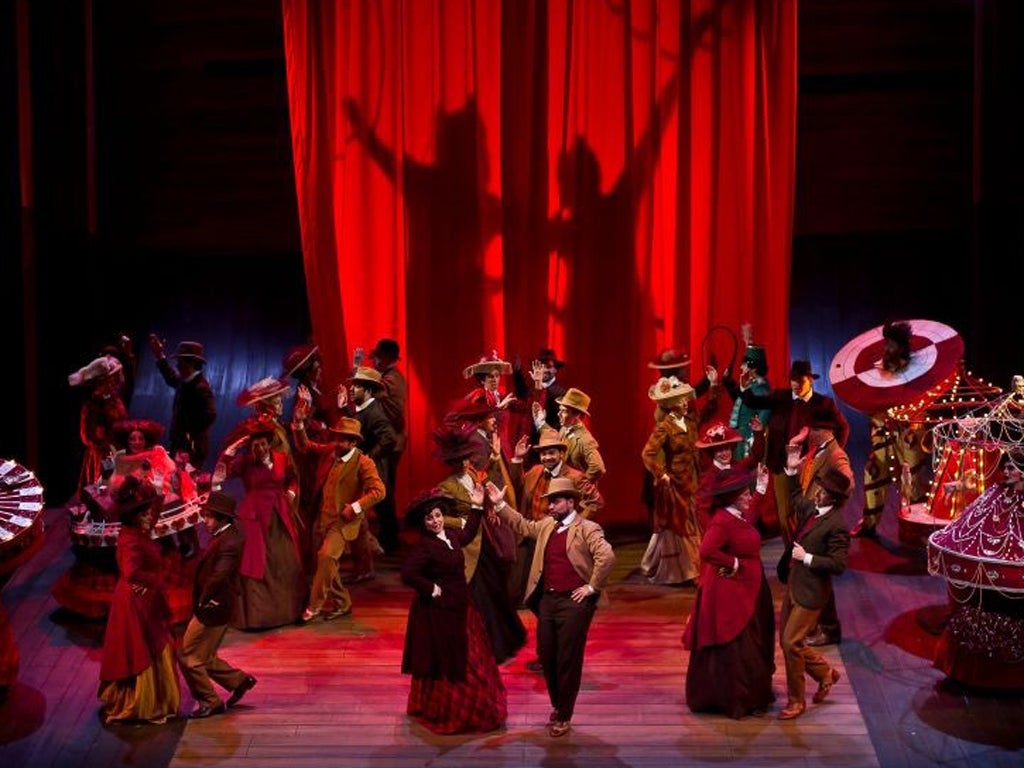Wexford Festival Opera, Wexford Opera House, Co Wexford, Republic of Ireland
Four operas at the ever resourceful Wexford keep the company and soloists on their toes

The pulse is slowed and the senses are quickened in A Village Romeo and Juliet. The merits and demerits of Delius's opera have been debated with baffling intemperance since its 1907 premiere as successive generations have puzzled over its ornate Edwardian libretto and six-fold sequence of near-static, Wagner-steeped tableaux. As with Pelléas et Mélisande, the vocal writing seems almost incidental to the hypersensitive flutter of the orchestral score. Fatally, there is no killer aria to be championed, just the love-drunk interlude, "The Walk to the Paradise Garden".
Difficult operas hold no fear for Wexford Festival, which for 61 years has been rehabilitating the unloved, the unfashionable and the unstageable. Set on a long curve of blond wood (designs by Jamies Vartan), Stephen Medcalf's production of A Village Romeo and Juliet allows the opera's heart to beat at its own dreamy pace, each chromatic dart gleaming under Rory Macdonald's beat. The strip of land that causes the feud between Manz (Quentin Hayes) and Marti (Andrew Greenan) is barren, yet to Sali and Vreli it is a playground and a paradise. First seen as children, then as adults, Sali and Vreli are true innocents. The contrast between their dream of marriage and the gaudy distractions of the fairground with its gossiping grotesques is bitter. Their subsequent rejection of the free life – and free love – offered by David Stout's Dark Fiddler seems inevitable, the slow drift into mutual oblivion in their sinking boat a homespun Liebestod.
Though handsomely staged and played, A Village Romeo and Juliet could not match the visceral impact of L'Arlesiana. All blood and rust to Delius's blues and greens, Cilea's 1897 opera was once celebrated for its tenor arias. (Enrico Caruso was the first Federico). In Rosetta Cucchi's Expressionism-meets-Pasolini production, it was instead a showcase for mezzo-soprano Annunziata Vestri (Rosa Mamai). Described by one wag as Carmen told from the point of view of Don José's mother, L'Arlesiana presents two parallel unravellings as Federico (Dmitry Golovnin) is driven mad by jealous love for the unseen vamp from Arles and Rosa Mamai plots fruitlessly to cure her son of his obsession, jack-knifing in fury and despair. The score is a surge of verismo sobs, delicate a capella choruses, keening cellos and provençal woodwind motifs. There's a thrilling performance from Vestri, the festival chorus and David Angus's orchestra, a touching debut from Mariangela Sicilia as Vivetta, and warm support from Christopher Robertson as the shepherd Baldassare, whose affection for Rosa Mamai's younger son, L'innocente (Eleanor Greenwood), is the only non-toxic love in the opera.
In Thaddeus Strassberger's over-stuffed staging of Chabrier's Le Roi malgré lui a cast of contemporary cosmopolitans, 18th-century courtiers, Polish television cameramen, dancing cleaners, a pregnant duchess and an exotic dancer styled as Bettie Page burst out of a series of container boxes. As with the Cilea and the Delius, the music is exquisite. But Chabrier lacked Offenbach's discipline and lavished too much on this meringue of a plot. Jean-Luc Tingaud conducted with elegance and verve but was unable to balance voices that ranged from tiny and pretty (Mercedes Arcuri's Minka) to mellow and flexible (Nathalie Paulin) to shouty (Liam Bonner's Henri).
Lennox Berkeley's A Dinner Engagement faired better. A period piece from its Elizabeth David recipes to its waspish comedy of diplomatic grandees fallen on hard times and its giddy waltzes, this 1954 one-acter was staged with great vivacity by Catriona McLaughlin, directed from the keyboard by Adam Burnette, and sung with charm. Any opera with a cook called Mrs Kneebone is all right by me.
'A Village Romeo and Juliet (00 35 353 912 2144) ends today
Critic's Choice
Daniel Tong, the Elias String Quartet and the London Bridge Ensemble survey England's most misunderstood composer, from early miniatures for violin and piano to the Cello Concerto, in Elgar Explored, Kings Place, London, (Thu, Fri & Sat). The BBC Symphony Orchestra and John Wilson celebrate the 50th anniversary of Croydon's Fairfield Halls with Vaughan Williams's Wasps, Finzi's Clarinet Concerto and Elgar's The Music Makers (Fri).
Join our commenting forum
Join thought-provoking conversations, follow other Independent readers and see their replies
Comments